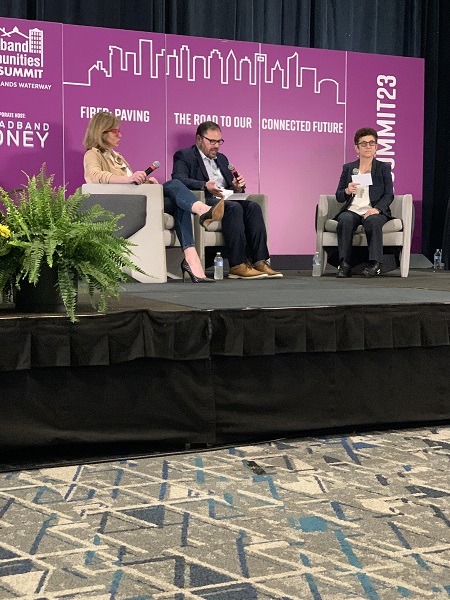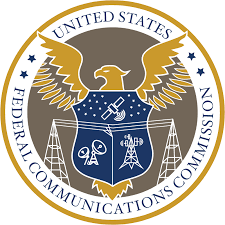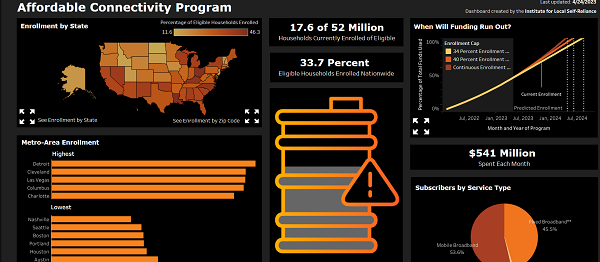
Fast, affordable Internet access for all.
Two months after President Biden’s belated and long-stalled Federal Communications Commission (FCC) nominee withdrew her nomination after a year-long attack campaign against her, today at the Broadband Communities Summit in Houston, Texas, Gigi Sohn announced her next move: Sohn will serve as the first Executive Director for the American Association of Public Broadband (AAPB).
A non-profit organization formed by a group of municipal officials, AAPB’s mission is to advance advocacy efforts on behalf of publicly-owned, locally-controlled broadband networks. Since the organization first announced its formation at the Broadband Communities Summit in May of 2022, it has been working to educate federal and state policymakers who “have turned to the telecom lobby for help and are receiving biased guidance” on the community broadband networks approach, just as $42.5 billion from the Infrastructure Investment and Jobs Act (IIJA) is set to flow to state governments to expand high-speed Internet access this summer.
During a keynote luncheon at the summit, Sohn was joined by AAPB founding board members Bob Knight and Kimberly McKinley on the main stage for a candid discussion in which she reflected on the state of Internet access in the U.S. and her experience that led to her to withdraw her nomination to the FCC. Near the end of the luncheon she announced her new role with AAPB, which was greeted by a standing ovation from the hundreds of attendees in the audience.
Freedom to Choose Community Broadband Future
The announcement was followed by a press briefing where she elaborated on her vision for AAPB.
“I will be the first Executive Director of the American Association of Public Broadband. Until now, there has not been a membership-based advocacy organization that works to ensure that public broadband can grow unimpeded by anti-competitive barriers. That’s despite the success of public broadband to help places like Chattanooga and the Massachusetts Berkshires transform from sleepy hamlets to vibrant centers of economic opportunity, education and culture,” she said at the press briefing.
“We have a chance to make a positive case for states to fund and communities to choose public broadband and oppose barriers to local choice,” she added, noting that she will not start until June 1 and will continue to serve as a senior fellow with the Benton Institute for Broadband & Society.

Sohn emphasized that she did not think publicly-owned broadband networks should be “the only game in town,” but that it was important to ensure that “public broadband (networks) has the same opportunity as private broadband providers.”
“This is about freedom. Communities should have the freedom to choose their broadband futures,” Sohn said, pointing to the 17 states in the U.S. with preemption laws that either outright ban or erect barriers to municipal broadband.
When she officially takes the reins at AAPB beginning in June, she said her top priorities would be to increase AAPB membership beyond its current “handful of members,” advocate for municipal broadband and other public entities to have access to the $42.5 billion in broadband deployment funds forthcoming from the Infrastructure Investment and Jobs Act (IIJA) – “at least on an equal basis as private providers” – and to tell the positive stories that will “make public broadband a thing that towns and communities want to have.”
Prominent public broadband advocates cheered the announcement.
“We think this is a wonderful match,” ILSR Community Broadband Networks Initiative Director Christopher Mitchell said after the announcement was made. “Gigi brings a wealth of passion and knowledge to AAPB and with her leadership this is a great opportunity to make sure everyone has high quality Internet access.”
“Gigi is highly respected by digital equity advocates everywhere. The dishonest attacks in opposition to her FCC nomination compromises the effectiveness of the FCC at this critical juncture in U.S. telecommunications, but advocates for better Internet access have gained a tremendous ally.”
Gigi Reflects on Bruising Battle to Break FCC 2-2 Deadlock
Digital equity and broadband-for-all advocates rallied behind Sohn as her nomination to fill the fifth seat on the FCC floundered in the U.S. Senate.
As we previously reported, President Biden belatedly nominated Sohn to the FCC nine months after he took office. As co-founder and CEO of the public interest group Public Knowledge and a former advisor to FCC Chairman Tom Wheeler, Sohn is well versed in media and telecom policy, and broadly popular across both sides of the aisle.

Yet, since she was first nominated for the post, Sohn was met with fierce opposition by Big Telecom, broadcast monopolies, and a bevy of politically constructed allegations designed to derail her nomination, ranging from false claims that she’d harm rural America, manufactured allegations that she hates police, and false assertions that she’s looking to censor conservative voices in media. After 16 grueling months of scrutiny and attacks and three nomination hearings, Sohn decided to withdraw herself from consideration in March despite having been reappointed by President Biden in January.
When she was first introduced at today’s Broadband Communities Summit luncheon, she received a standing ovation. “I needed that,” she said in expressing her gratitude for the support she has received from many in the audience.
Sohn went on to describe the nomination process as akin to being thrown into “a washing machine full of rocks,” adding that her presence at the summit was her first public appearance in months.
Asked about whether she thinks a qualified candidate will be appointed to the FCC to break the 2-2 deadlock, Sohn said “someone will take the nomination but whether they can get through (the nomination process) is another story. And it’s not just the FCC being tied up. There’s a push to not make government work, period” across a number of federal agencies.
“It was unbelievable the amount of dark money that was spent to defeat me. There was even a billboard on The Strip in Las Vegas that said: ‘Gigi is too extreme for the FCC.’ I expected opposition but a billboard on The Strip in Vegas?”
Sohn said she had no idea who or when someone else will be nominated but whoever it turns out to be will have a difficult time “getting over the line. There’s blood in the water now. I had a 16 month proctology exam and I don’t wish that on anybody.”
Action at State and Local Level
Moving on to other topics, Sohn didn’t shy away from noting how monopoly telecom and cable providers have long been against competition, which is why so many states have laws (ghost-written by industry lobbyists) that either outright ban or erect barriers to municipal broadband. While she was heartened that a bill has been filed in Congress to preempt states from having such anti-competitive laws, she did not think the legislation would ultimately pass given how beholden members of Congress on both sides of the aisle are to Big Telecom and Big Cable.
However, she said, “the action is not really at the federal level. The action is at the state and local level now,” especially since the pandemic made everyone realize the vital importance of universal access to high-speed Internet connectivity.
With tens of billions in federal funds made available through the American Rescue Plan Act and the forthcoming $42.5 billion for the building of new broadband networks from the bipartisan infrastructure bill, Sohn said some states like Maine and Vermont are “ready to roll,” while other states are “starting from square one.”
One piece of advice she offered up to state and local officials: “if you are going to seek consulting help, be careful who you choose and make sure they have serious expertise.” There are plenty of consulting firms out there, she said, that are just in it to make money and not truly serve their clients best interests.
“I’ve heard someone call them broad-bandits,” she said.
Save ACP and Help States Shortchanged by Bad FCC Maps
She also encouraged those in attendance to contact their Senators and push them to appropriate more funds for the Affordable Connectivity Program (ACP), which is projected to run out of funds as soon as next summer, leaving tens of millions of income-eligible households who currently receive the $30/month subsidy to help pay for home Internet service in the lurch.

“This needs to happen this year. It seems to be a no-brainer,” she said. “The big companies want this, healthcare providers, libraries, a huge coalition of folks want this. But tick-tock, we are running out of time.”
When asked about the flawed FCC maps that will determine how much each state will get in BEAD funds from the infrastructure bill, Sohn said she has spoken to state broadband offices who worry their state will be short-changed because the FCC maps don’t accurately reflect how many unserved and underserved locations there are in their states.
Sohn said some states will likely lose out on potentially hundreds of millions of dollars.
“There’s not enough transparency about the data submitted by ISPs and challenges that are being made to the maps,” she said. “We have to think about the states that will really get hosed. Is there a way to hold them harmless? If, say, Nevada loses out on $100 million because of the bad maps, where can we get that money? Well, I’ve got an idea.”
Her idea is to use a portion of the $16 billion in left-over dollars from the Rural Digital Opportunity Fund (RDOF) to make those states whole who may not get as much as they are entitled because of the FCC’s faulty maps.
Though she touched on the multitude of challenges in ensuring everyone has access to broadband, Sohn said she wanted to end her remarks on a positive note.
“I am really excited about the future of community broadband. We have a huge opportunity, so let’s grab it,” she said to another standing ovation.
